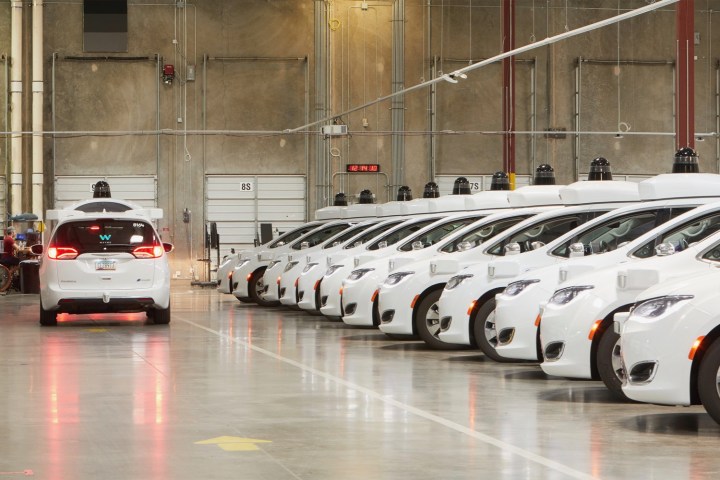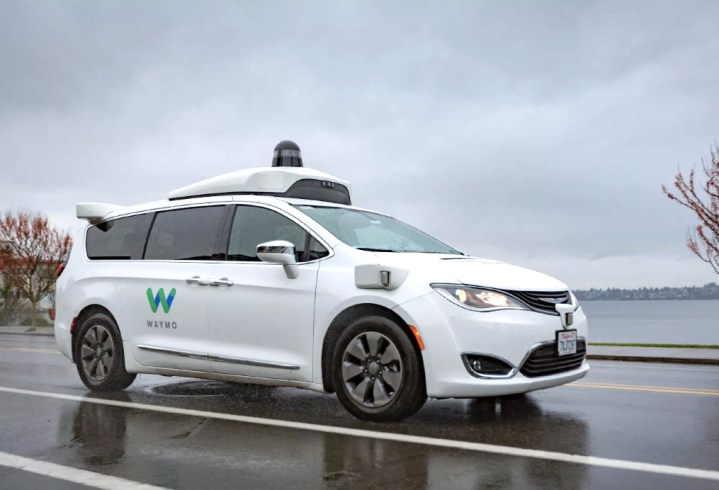In a year marred by an ongoing global pandemic, it’s temptingly easy to argue that ridesharing is doomed. Why would you want to ride with strangers and go Dutch on a herd of germs when you could drive your own car and know whose filth you’re bathing in? This argument has merits, but it leaves out the millions of people who do not own a car for a variety of reasons, and it falsely assumes that society’s coronavirus-related wounds will never heal.
Ridesharing is undeniably down, but it’s not out. As self-driving car technology continues its steady march forward, ridesharing could very well bounce back as a convenient — and safe — mode of transportation. Autonomous vehicles that hold one fewer warm, breathing body feel more relevant than ever before. To get a glimpse of the road ahead, Digital Trends spoke with Waymo, one of the leaders in the field, to find out how the coronavirus-related lockdowns and stay-at-home orders affected its operations, and what it’s doing to maintain the trust of its growing ridership.
Code-at-home orders

Like an alarmingly high percentage of companies across the United States, Waymo closed most of its facilities in March 2020 to comply with local and national orders. Prototype self-driving Chrysler Pacificas stopped racking up miles across the United States, and engineers consequently stopped analyzing the massive amount of data generated and uploaded by the test fleet on a daily basis — but the company’s employees weren’t spending their days catching bugs in Animal Crossing during the pause. For many, work never stopped; it was merely relocated.
“We continued to advance our technology with continued focus on hardware and software development, driving in simulated environments, and ongoing investments in advanced algorithms, machine learning, and evaluation. Additionally, we’ve been able to continue conversations with partners on the business side, and continue much of the work we set out do to this year across other areas as well,” a spokesperson for the company told me.
Simulation technology has become so accurate that engineers managed to fine-tune Waymo’s software and hardware without deploying prototypes on the nation’s public roads. But there’s ultimately no substitute for real-world testing, so the company dusted off its super-smart minivans as soon as it was safe and legal to do so.
Waymo is taking a tiered approach to resuming its operations. It began testing prototypes in Phoenix, in the Bay Area, and in Michigan in May after taking comprehensive measures to ensure employees are safe. Notably, they received training to learn about what the company calls a new normal, and the facilities they work in have been deep-cleaned and redesigned to comply with social-distancing measures. They’ll be sanitized more often, too.
While the pandemic seemingly reminded many people that they need to wash their hands on a regular basis, it’s important not to forget germs cause plenty of other diseases ranging from the common cold to more serious illnesses. Waymo pointed out it has always cleaned its vehicles on a regular basis, but even so, it’s increasing the number of times they’re disinfected each day to further reduce the risk of giving germs an autonomous ride.
Waymo’s cleaning process sounds like overkill, which is exactly what you want to hear before you hop in a shuttle that thousands of strangers have sat in before you. It uses AutoNation’s PrecisionCare treatment, described as “the first system that pairs an electrostatic sprayer with trusted Clorox products to quickly and easily reach areas of your vehicle where germs live.” PrecisionCare nukes germs even if they’re cooped up in nooks and crannies.
What about the riders?

Riders will benefit from the same measures keeping Waymo employees safe and healthy. The company in an interview that it hopes and expects to resume its Waymo One autonomous ridesharing service soon, though it didn’t provide a more specific timeline, and it set up channels through which current and future riders can share their concerns. The company will implement some of the suggestions it receives to welcome riders in an environment they’re fully comfortable with.
Studies carried out earlier this year confirmed Americans are using ridesharing services less often to reduce the odds of catching and/or spreading a contagious virus, and many are driving their car instead. That’s a good option for those who own a vehicle, but the car-free population still needs to move, and Waymo’s driverless service may be safer (or, at least, more attractive) than other alternatives. “While we’ve yet to realize the long-term effects of this pandemic, we can imagine that society’s view on sharing space with a human driver may forever change,” the company told me.
Before it stopped giving rides, Waymo was carrying thousands of monthly users through its Waymo One program and its partnership with Lyft. It logged between 1,000 and 2,000 rides weekly, and anywhere between 5 and 10% of them were fully driverless, meaning without a human driver or engineer behind the wheel. Waymo expects it will continue growing when it’s safe to do so, and it has received positive feedback from regular riders.
“I would be completely comfortable riding with Waymo again. Ever since the service was suspended, I went back to taking the bus and using other ridesharing services in order to get to and from work. If Waymo services resumed, switching back to the cleaner cars would be a no-brainer, as your cars are still the safer option,” said Xavier Botiller, a rider interviewed by Waymo for this story.
The conditions Botiller will soon ride in haven’t been defined yet. Waymo is examining the lessons learned as it resumed testing and analyzing feedback from riders to figure out the best way forward. It’s reasonable to assume social-distancing measures will need to be taken into account. What’s certain is that Waymo One will return.



